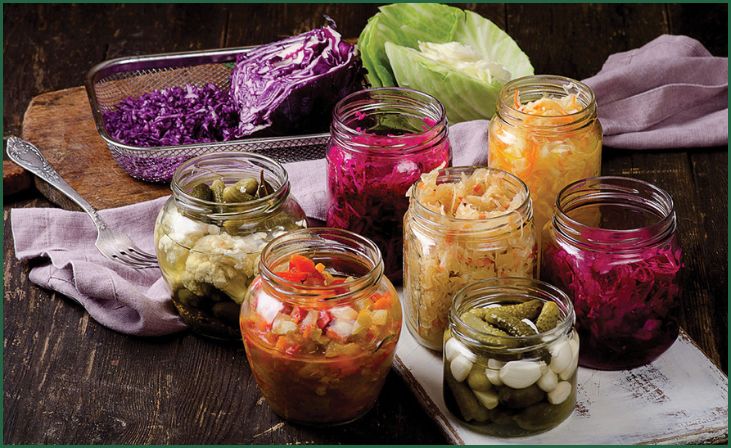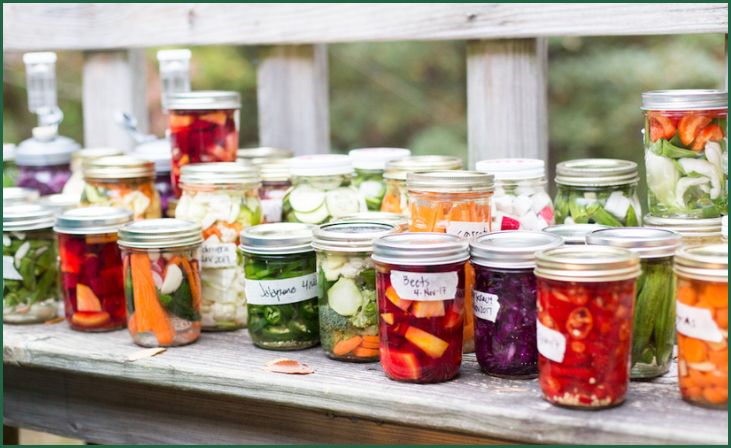Fermenting food has been a time-honored practice in cultures around the world, dating back centuries. It is a natural preservation method that not only enhances the flavor of the food but also provides numerous health benefits. In this comprehensive guide, we will explore the top 7 reasons to ferment foods and learn how it is a smart choice for your well-being. Whether you’re new to fermentation or looking to expand your knowledge, read on to discover the wonders it can do for your health.
Table of Contents
ToggleThe Magic of Fermentation
Before we delve into the reasons, let’s understand the magic behind fermentation. Fermentation is a process where natural bacteria or yeast convert carbohydrates into alcohol or organic acids under anaerobic conditions. This process not only preserves the food but also breaks down complex compounds, making nutrients more accessible to the body. The resulting fermented foods are teeming with probiotics and enzymes, promoting a healthy gut and overall well-being.
Top 7 Reasons to Ferment Food for Better Health
Find here the top seven reasons to ferment food that will instantly help you to improve your health.
1. Improved Digestion

Fermented foods are packed with probiotics, which are beneficial bacteria that support gut health. When you consume fermented foods, these probiotics populate your intestines, aiding in the digestion of food and the absorption of nutrients. This can alleviate digestive issues such as bloating, gas, and constipation, ensuring that you get the most out of your meals.
2. Enhanced Nutrient Absorption
During the fermentation process, enzymes are produced, breaking down complex nutrients into more digestible forms. This enhances the bioavailability of vitamins, minerals, and other essential nutrients present in the food. As a result, your body can absorb and utilize these nutrients more efficiently, contributing to better overall health.
3. Strengthened Immune System
A healthy gut is closely linked to a robust immune system. The probiotics found in fermented foods play a vital role in supporting the gut’s immune function. They help prevent the growth of harmful bacteria and stimulate the production of immune-boosting substances. By incorporating fermented foods into your diet, you can bolster your body’s natural defenses and reduce the risk of infections and illnesses. Well, this is one of the best reasons to ferment food.
Don't just scroll, subscribe!
BuzzTrail's unique web-stories are the cure for boredom you've been waiting for.
4. Reduction of Food Allergies and Sensitivities

Fermentation can potentially reduce the allergenicity of certain foods. Though, these can be the perfect reasons to ferment food. The breakdown of proteins during fermentation can make them less likely to trigger allergic reactions or sensitivities. If you’re sensitive to certain foods, fermenting them might make them more tolerable for your digestive system.
5. Mood and Mental Health Benefits
Did you know that your gut is often referred to as your “second brain”? The gut-brain connection is significant, and a healthy gut can positively influence your mood and mental health. The probiotics in fermented foods can produce neurotransmitters like serotonin, known as the “happy hormone.” Regular consumption of fermented foods may help alleviate symptoms of anxiety and depression, promoting emotional well-being.
6. Detoxification and Elimination of Toxins
Fermented foods can aid in detoxifying the body by promoting regular bowel movements. The probiotics and organic acids produced during fermentation help maintain a balanced gut flora, supporting the efficient elimination of waste and toxins. This cleansing effect can contribute to clearer skin and improved overall vitality.
7. Economical and Eco-friendly Food Preservation

Fermenting food is not only beneficial for your health but also for your budget and the environment. This ancient preservation technique allows you to extend the shelf life of perishable foods without the need for refrigeration or chemical preservatives. By reducing food waste and reliance on energy-intensive food storage, you contribute to a greener, more sustainable planet.
Conclusion (Reasons to Ferment Food)
In conclusion, fermenting food offers a treasure trove of health benefits that can revolutionize your well-being. From improving digestion and nutrient absorption to strengthening the immune system and supporting mental health, fermented foods are a valuable addition to any diet. Embrace this ancient tradition and embark on a journey of better health and vitality by incorporating delicious and nutritious fermented foods into your daily life.
Remember, the magic lies in the process of fermentation, where ordinary ingredients transform into extraordinary sources of nourishment and delight.
Frequently Asked Questions (FAQs)
Can fermented foods help with weight management?
Can fermented foods help with weight management?
Yes, fermented foods can aid in weight management. The probiotics and enzymes in fermented foods can support a healthy metabolism, which may contribute to weight loss or maintenance when combined with a balanced diet and regular exercise.
Are there any risks associated with fermenting food at home?
Are there any risks associated with fermenting food at home?
While fermenting food at home is generally safe, there are some risks involved. The most common issue is contamination by harmful bacteria, which can lead to foodborne illnesses. To minimize risks, follow proper hygiene practices, use clean equipment, and monitor the fermentation process carefully.
Which fermented foods are suitable for vegans?
Which fermented foods are suitable for vegans?
Several fermented foods are suitable for vegans, including sauerkraut, kimchi, pickles, kombucha, and coconut yogurt. These plant-based options offer a wealth of probiotics and health benefits without the use of animal products.
How long do fermented foods last?
How long do fermented foods last?
The shelf life of fermented foods varies depending on the type and storage conditions. Generally, fermented vegetables can last for several months, while beverages like kombucha and water kefir have a shorter shelf life of a few weeks to a month.

